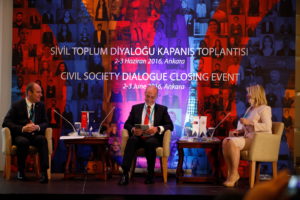
Technical Assistance for Implementation of Civil Society Dialogue and Civil Society Support Programmes (TR2015/DG/01/A5-01/001)
The overall aim of the project is to increase bilateral exchanges and cooperation between CSOs in Turkey and the EU at local, regional and national levels, to promote awareness raising initiatives on importance and benefits of membership of Turkey to the EU within Turkey and EU and on

Support for Policy Reform Accession and Effectiveness (SUPRAE)
In March 2020, North Macedonia began accession negotiations with the EU. However, the country still needs to meet EU standards, enact essential reforms, and institutional capacities to comply with the acquis and clusters. The project’s goal is to assist North Macedonia in its EU accession by increasing strategic

Technical Assistance for Building the Capacity of EU Affairs in the Governorates
It is very beneficial to strengthen the quality of information on EU issues for all stakeholders and to improve the capacity of the Administration at the local level to support the management of EU funds and engagement in the accession process. Thus, the project assisted in increasing the

Technical Assistance for the Promotion of Civil Society Dialogue between EU and Turkey
Turkey’s European Union (EU) accession negotiations needed to eliminate the existing prejudices and suspicions between the EU and Turkey, and it needed to take an adequate step to strengthen the social and cultural dialogue between the two sides. Therefore, the project aimed to enhance contacts and the mutual

Technical Assistance for Strengthening Social Dialogue, for Innovation and Change in Turkey
It can be said that the progression through an in-depth training programme and an understanding of the techniques associated are essential for a contemporary understanding of social dialogue concepts and their implementation. In this regard, the project aimed at social development and the enhancement of social cohesion within

Technical Assistance for the Capacity Building of General Directorate of Highways for the Road Infrastructure Safety Management in Turkey
The project aims to enhance the administrative capacity of the General Directorate of Highways (KGM) to implement road infrastructure safety management and harmonise Turkish legislation with directive 2008/96/EC.

